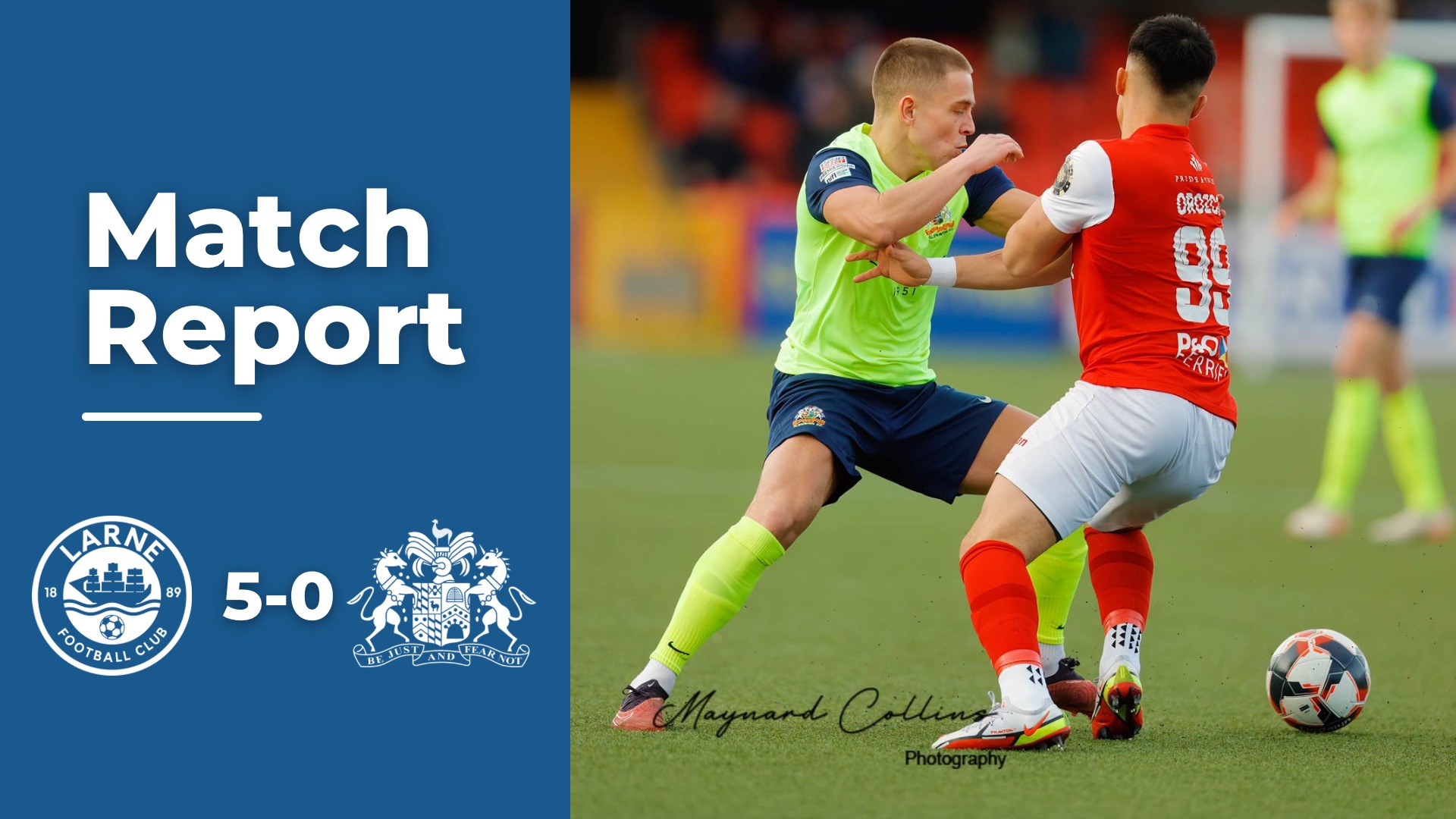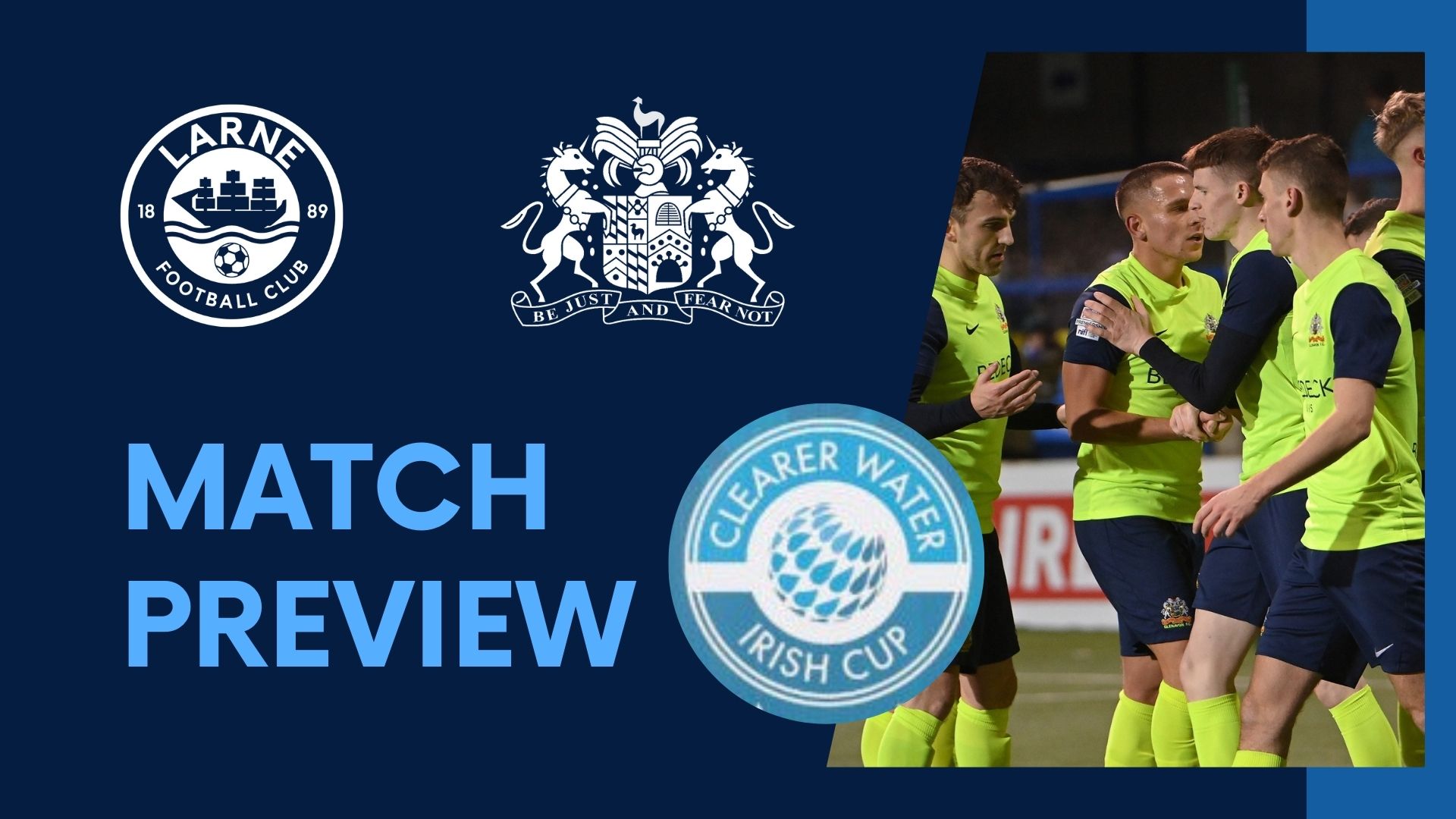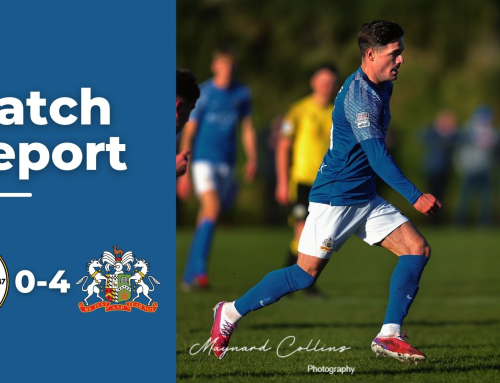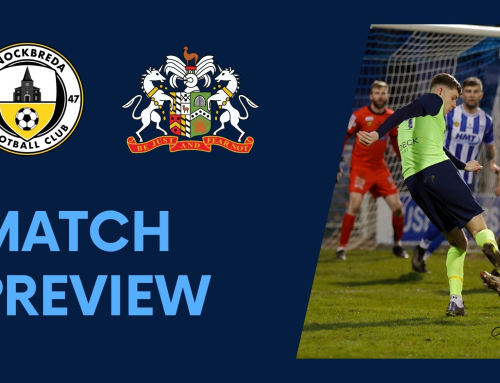IRISH CUP MEMORIES: A GREAT TEAM BUT A DARK DAY
Glenavon boasts seven Irish Cup triumphs. No provincial club has won the tournament more often or contested more finals. That is the Lurgan Blues’ impressive record in Irish football’s blue ribband competition.
Glenavon 2 Derry City 0 (1957), Glenavon 2 Ballymena United 0 (1959), Glenavon 5 Linfield 1 (1961), Glenavon 2 Linfield 1 (1992), Glenavon 1 Cliftonville 0 (1997), Glenavon 2 Ballymena United 1 (2014) and Glenavon 2 Linfield 0 (2016) are the scorelines etched forever in the Lurgan club’s annals.
Yet the most talked about result in Glenavon’s history was none of these. It was the 3-0 defeat against Dundela in the 1955 decider. This was a cup shock of gargantuan proportions. It was quite simply the greatest upset in the history of club football in Ireland.

The Ireland’s Saturday Night headline following Glenavon’s shock defeat.
In April 1955 Glenavon was at the peak of its powers. The Lurgan team, under the management of Jimmy McAlinden, included such illustrious names as Wilbur Cush, Jimmy Jones, Jackie Denver, Maurice McVeigh, Paddy Corr and Billy Liggett. All except Corr had already won League Championship winners’ medals. Cush and Corr had established what many regard as the Irish League’s best-ever half-back partnership. McVeigh had become the finest winger in the local game and, of course, Jones was in the process of re-writing the goalscoring record books.
In September 1954 Glenavon defeated Coleraine 3-1 in the Ulster Cup Final after finishing above Linfield in the group stages. In November 1954 the Lurgan Blues clinched the City Cup with nine wins and a draw from its 11 matches. Comfortable victories against Glentoran (6-2) and Ballymena United (4-1) also propelled the team into the Gold Cup Final. Glenavon was top of the Irish League Championship with 15 wins and three draws from its 20 fixtures.
Glenavon’s progress to the Irish Cup Final had been equally impressive. A 0-0 draw at Grosvenor Park against Distillery in the opening round was followed by a 5-1 victory in the replay. Jimmy McAlinden’s men defeated Ards 1-0 in the quarter-final and overpowered Glentoran 5-0 in the semi-final. The success against the Glens was perhaps the apogee of Glenavon’s remarkable season. The inspirational Cush and his team-mates were so dominant that the Belfast News Letter likened the 90 minutes to a practice session:
So far as Glenavon was concerned the semi-final at Windsor Park was nothing more than a brisk training spin against a side completely bewildered for the greater part of the game. There was no comparison between the teams, the one bright and speedy, the other dull and sluggish.
The thrashing of Glentoran again demonstrated that in Irish football, at the time, there was no better player than Wilbur Cush. He completely emasculated the opposition forwards whilst also providing a creative spark. The Belfast News Letter’s report highlighted Cush’s utter dominance:
Cush stood out prominently at left-half. Always back in defence when danger threatened and never failing to move into attack when the opportunity was there, Cush got through more work than any other player on the field.
He was a real inspiration behind Glenavon’s success. Not content with doing a very satisfactory job on the left there were times when he was in the thick of it on the opposite side of the pitch helping Corr.
Dundela played in the Irish Alliance, two leagues below the Irish League. Ironically, its team included George Miller and Howard Lynch, two Glenavon Reserves players. Although the East Belfast men had beaten Crusaders 2-1 in the other Cup semi-final, there had been nothing either in that performance or in their league displays to suggest that an upset was remotely possible. The conclusive evidence, if evidence was needed, that Glenavon would blow the minnows away in a barrage of goals came during the interval between the semi-final and final when Glentoran defeated the Duns 4-1 in a County Antrim Shield tie. How could Dundela – indeed how could any club – stop Glenavon’s seemingly inexorable march to a historic clean sweep of all the trophies?
The final, staged on Saturday 23rd April 1955 began, for Glenavon supporters, as a relaxing day out. There was no tension, no concern, no worry. It was an opportunity to collect another trophy and hail the achievements of an outstanding team. The club was so certain of victory that it arranged the Celebration Banquet in advance. The menus were printed describing Glenavon as “Irish Cup Winners” and the “Team of the Season.”
Some Glenavon fans managed to bring a goat painted blue and white onto one of the special trains which took thousands from Lurgan to Belfast for the big match. The Geddis brothers, Cecil and Wilfie, drove to the city on a two-horse cart bedecked in blue and white streamers. It carried the Troubadours, one of the Province’s leading bands. Its members were all Glenavon fans. The wagon paraded up the Lisburn Road to the sounds of clarinets, drums, and cymbals followed by hundreds of excited supporters. Arrangements had been made for Cecil, Wilfie and co. to meet the victorious Glenavon team in Moira after the post-match meal and lead a cavalcade through Magheralin into Lurgan for a night of celebration.
Nothing, it seemed, could spoil the party.

Cecil Geddis on board Wilfie Geddis’ Cup Final cart with Jim McCleary, Davy Gracey, Billy Cousins, Andy McCleary and Stuart Hall.
Even when Bobby Ervine lobbed the ball over Walter Durkan’s head to give the underdogs an early lead there was no sense of unease amongst the Glenavon players. They had dominated possession in the opening minutes and continued to do so. Cush created an opening from which Maurice Masters drove the ball against the base of a post. Jones also hit an upright and Denver flashed a header narrowly wide. But no matter how hard the Lurgan men tried, they were unable to force an equaliser. Ten minutes from time Ervine capitalised on a mistake by Billy Liggett to make the score 2-0. Then, with two minutes to go, Jackie Greenwood administered the coup de grace, running through a non-existent defence to plunder a third. When the final whistle blew the Glenavon players fell to their knees in shock as much as in disappointment. The impossible had happened. Football’s law of gravity had been turned on its head. Little Dundela had humbled mighty Glenavon.
“The dressing-room afterwards was like a morgue,” reflected Jimmy Jones. “No one said anything. I don’t think any of us, Wilbur Cush included, could believe what had happened.” A lethal cocktail of complacency, a rock-hard pitch, some below-par performances and rank poor finishing had ended Glenavon’s hopes of a first-ever Cup win. Jones was honest enough to admit that he and his team-mates were guilty of taking the juniors for granted. “Everyone I spoke to in Lurgan beforehand talked as if it was only a matter of us driving to Belfast to collect the trophy. That was the mood. We tried to be professional but no matter what way we looked at it, it was a match which we were certain to win.”
Maurice Masters also fell into the complacency trap. “Beforehand we all thought that it was an unfair contest. How could Dundela live with us? They scored early on and we kept on thinking that goals would come. In reality we were just going through the motions and, of course, we didn’t equalise, and they scored two more goals late on. Even Billy Cush did not play well. He played like an ordinary player rather than like a man and a half.”
For Masters, the indignity of what had occurred on the Windsor Park pitch was replicated later in the evening. “I had arranged with my girlfriend that if we lost, I would meet her in Caprone’s Dance Hall in Bangor,” he explained. “I was dancing on the dancefloor. Suddenly the music stopped and for a split second there was silence in the room. Then I heard a voice. “Maurice, would you like to see an Irish Cup winner’s medal?” I looked across and there was George Miller who had played against me that day for Dundela. I was so embarrassed. Everyone in the place seemed to be staring at me.”

Maurice McVeigh, at the peak of his powers.
Maurice McVeigh, Glenavon’s brilliant left winger, had won the prestigious Ulster “Footballer of the Year” accolade. “I had to go from the after-match meal, which was held at the Royal Midland Hotel, to the Park Royal on the Holywood Road to collect the trophy. You can imagine how I felt. It was the biggest anti-climax of my entire career. I thought that I would never get over it.”
Cush and Jones were so ashamed and traumatised by what had happened that, after reaching Lurgan, they slipped into an outhouse at Jim and Rachel Matthews’s farm in Taghnevan and spent the rest of the evening consoling each other in semi-darkness. The next day the two friends and Jackie Denver were due to attend a special Sunday afternoon Sportsman’s Church Service in Hillsborough. “Whereas Jackie and I normally collected Wilbur outside the Electricity Board’s showroom at the top of Windsor Avenue, he asked us to meet him at the bottom of Castle Lane instead. He was so embarrassed. He wanted as few people to see him as possible. Jackie and I felt the same way. It had been a public humiliation.”
Later the Dundela secretary, Tommy Boyd, revealed that his side’s two inside-forwards had been instructed to “concentrate on marking the Glenavon wing half-backs, Corr and Cush, to prevent them coming through with passes to the three dangerous inside forwards, Denver, Jones and Campbell.” It was a strategy that worked.

Wilbur Cush.
Sometime afterwards Wilbur Cush talked about the defeat in a newspaper article. “I don’t want to make any excuses or to take anything away from Dundela’s wonderful victory, which is good for Irish football, but it just wasn’t our day. We were well beaten by a grand little team who were more adaptable than we were on the hard ground.” Those sanguine words mask his true feeling, one of absolute devastation.
Four days after the Cup Final debacle, Glenavon defeated Bangor 4-1 at Clandeboye Park to consolidate its position at the top of the League Championship. Now the Lurgan Blues could clinch a second league title with a victory against Cliftonville at Mourneview Park. The North Belfast club was marooned in mid-table with nothing left to play for. Again, Jimmy McAlinden’s men were overwhelming favourites.
Before the kick-off two small boys presented Wilbur Cush with a white rabbit sporting a blue ribbon. It was intended as a “Good Luck” gesture. The fact that the rabbit escaped the Glenavon skipper’s clutches suggested that things might not go to plan. Sure enough, Cliftonville stunned the home team by taking a 35th minute lead. Glenavon seemed anxious, nervous and out-of-sorts. At half-time McAlinden made a series of positional changes. Within seven minutes they seemed to have worked. The three men who had been asked to switch places combined to create and score the equaliser. Maurice Masters passed the ball forward to Cush, now the inside-left, and he delivered a penetrating cross which Stewart Campbell despatched to the net with gusto.
The home fans expected the goal to spark their favourites into life. Unfortunately, it didn’t. Indeed, far from improving, things got worse. Wilbur Cush fell awkwardly and hurt his lower back. He was in excruciating pain and afterwards had only limited mobility. Despite that, he continued to urge his team-mates to push forward. But even his brave response to injury could not shake the home side out of its lethargy. With Linfield winning 2-1 against Derry City, Glenavon’s 1-1 draw meant that the two challengers finished the campaign on 36 points from 22 matches. In the modern era, the Lurgan Blues’ vastly superior goal difference would have given them the title. However, in 1955 the rules of the competition dictated that the destiny of the Championship would be decided by a Test Match.
Before the play-off could take place Glenavon and Linfield met in the long-delayed Gold Cup Final. During the build-up, the focus was on Wilbur Cush’s fitness. Would he play? Although severely hampered, he took the field and produced a typically imperious exhibition. Indeed, he created the opening goal for Jones with a brilliant 50-yard pass hit from his own six-yard area. The centre forward scored twice more to give Glenavon a 3-2 lead. Late in the match, as Linfield pressed for an equaliser, Cush made a crucial interception, kicking the ball over his own crossbar. When the final whistle blew hundreds of Glenavon fans surged onto the field to greet their heroes. Ten minutes later, high up in the new Oval grandstand, Wilbur raised the trophy to huge cheers from the pitch below. He had made history, becoming the first provincial club captain to lead his men to three major trophy wins in a single season.

Glenavon with the Ulster Cup, City Cup and Gold Cup. Back Row L to R: Ned Greer, Billy Liggett, Walter Durkan, Bobby Armstrong, Jimmy McAlinden. Front Row L to R: Maurice Masters, Jackie Denver, Jimmy Jones, Wilbur Cush, Stewart Campbell, Maurice McVeigh, Jack Jones.
When the two sides met three weeks later to decide the destiny of the league title, Glenavon failed to hit the heights of its Gold Cup triumph and lost 2-0. Nevertheless, it had been a memorable season. Jimmy McAlinden’s team had captured the Ulster Cup, City Cup and Gold Cup and come within two victories – against Dundela and Cliftonville – of matching the achievements of the great Linfield team of 1921-22 by winning all the trophies.





